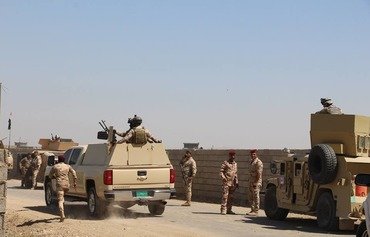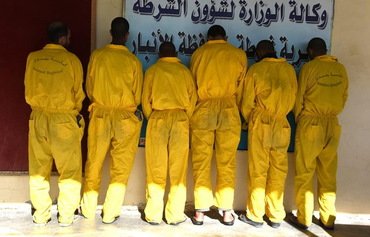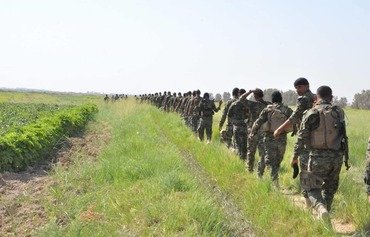The "Islamic State of Iraq and Syria" (ISIS) presence in Iraq is now reduced to scattered cells without a centralised structure, which are gradually weakening as a result of the military pressure on their hideouts, Iraqi officials said.
“ISIS has not only fallen militarily but also at a strategic level," said Iraqi MP for Diyala Abdul Khaliq al-Azzawi, who serves on the parliamentary security and defence committee.
The group “has lost its organisational structure, funding, weapons and human resources”, he told Diyaruna. “We are no longer talking about a group, but pockets of fighters who take shelter in uninhabited areas."
The bases where these remnants seek refuge are "no safe havens for them", he said, noting that consecutive security operations have forced them to exercise caution and only move around when absolutely necessary.
![Iraqi police conduct a search operation for ISIS elements in al-Hawijah villages in western Kirkuk on December 2nd, 2018. [Photo courtesy of the Federal Police Command]](/cnmi_di/images/2019/04/19/17707-Iraq-Anbar-Hawijah-600_384.jpg)
Iraqi police conduct a search operation for ISIS elements in al-Hawijah villages in western Kirkuk on December 2nd, 2018. [Photo courtesy of the Federal Police Command]
Iraqi intelligence services and security forces meanwhile have been targeting ISIS remnants, killing their leaders and burning down their rest-houses, he said.
During recent security operations in the Hamreen mountains, a senior ISIS leader and three of his aides were killed, the Iraqi Counter-Terrorism Service (CTS) said Monday (April 15th).
Prior to this, an operation in the Hamreen mountains supported by Iraqi and international coalition warplanes blocked a "major terrorist plot", CTS spokesman Sabah al-Numan told Diyaruna.
Returning displaced population
It is important to sustain a state of heightened security, as this “is the only option we have to ensure our country stays safe and stable”, al-Azzawi said.
He also stressed the importance of moving quickly to return displaced residents to their villages.
“There are 14 villages between Diyala and Salaheddine provinces that remain empty of their inhabitants," he said.
The return of these residents “is a key factor for stability, particularly within the administrative borders between liberated provinces, where some terrorists are still hiding”, al-Azzawi said.
"ISIS cells are trying to fill the vacuum left by fleeing residents to regroup in an attempt to threaten nearby populated villages," he said.
Security forces and the tribes of al-Mukhaisa village in Diyala thwarted an ISIS attack on April 13th that was launched from the border with Salaheddine, he said.
“They killed four terrorists and forced the other attackers to retreat, but the attack resulted in the death of two tribesmen," al-Azzawi said.
Civilian co-operation essential
ISIS is a “cancerous cell that should not be left untreated”, Ninawa provincial council security committee member Hassan Shabib told Diyaruna.
"The defeat of the group during liberation battles has opened the door for a long, drawn out fight against its remnants," he said. “Today, control is in the hands of our soldiers, who have taught these elements hard lessons."
Shabib stressed the need for civilians to come forward with information to help security forces locate ISIS sleeper cells and elements hiding in the desert and mountain caves, as well as their financiers and supporters.
He pointed to the Monday arrest of a man and his wife who had been supplying food to ISIS elements hiding in Makhmour mountains, after local residents provided a tip-off.
While security efforts have significantly reduced the group's threat, ISIS "has not been completely eradicated", he cautioned.
Sporadic attacks, such as the Monday abduction of three civilians in Ninawa's al-Biaj area, indicate the battle to root out ISIS has not yet been concluded, Shabib said.
“ISIS is dying as its military defeat has left it without leadership or organisational management," provincial council security committee member Shallal Naji Obeid told Diyaruna.
The remaining ISIS cells are fragmented and are losing members, he said.
"Our forces are taking the initiative to attack and hold the ground”, Obeid said. "We have to stay alert and continue to go on the offensive."

![An Iraqi army unit finds an ISIS hideout in western Anbar on December 20th, 2018. [Photo courtesy of the Iraqi Ministry of Defence]](/cnmi_di/images/2019/04/19/17706-Iraq-Anbar-ISIS-600_384.jpg)






